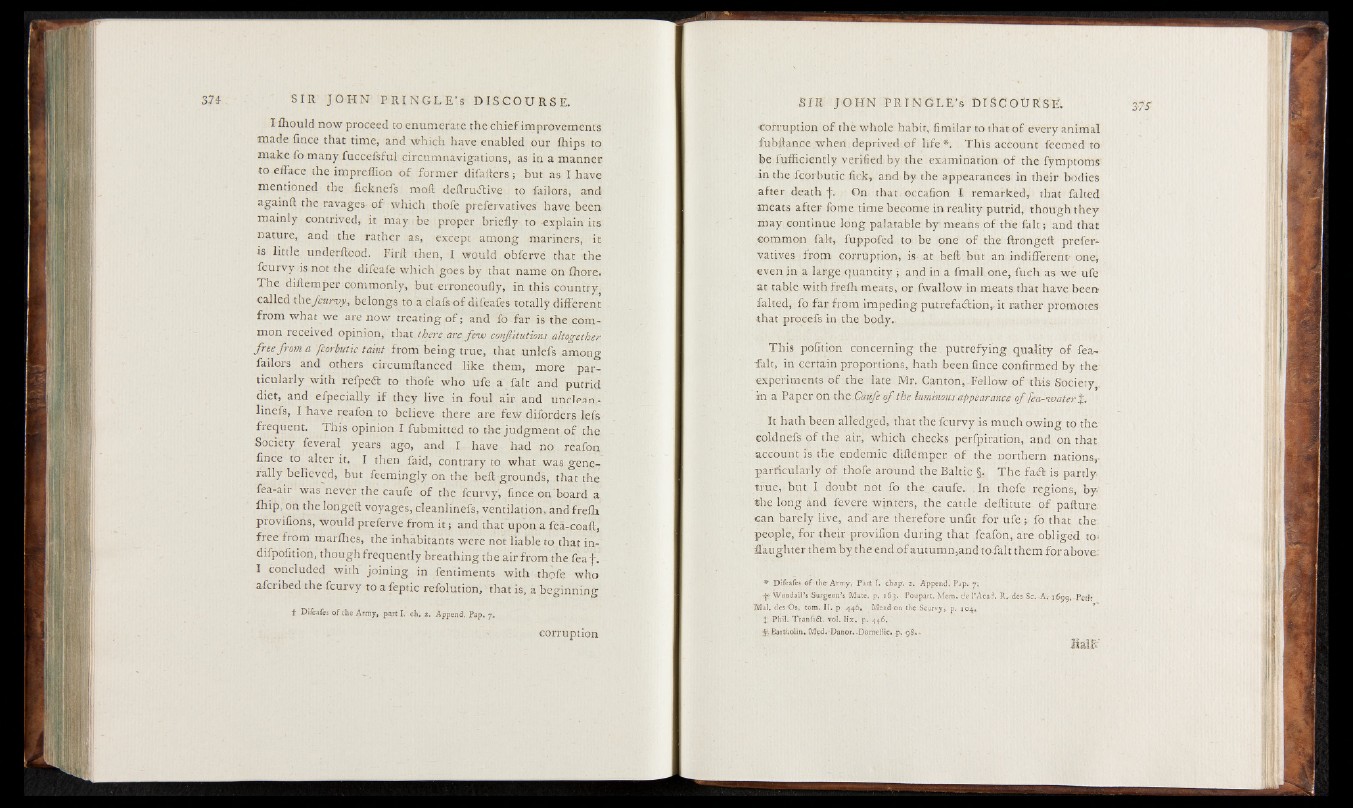
I fliould now proceed to enumerate the chief improvements
made fince that time, and which have enabled our fhips to
make fo many fuccefsful circumnavigations, as in a manner
to efface the impreflion of former difafters; but as I have
mentioned the ficknefs mod deftruitive to Tailors, and
again!! the ravages of which thofe prefervatives' have been
mainly contrived, it may be proper briefly to -explain its
nature, and the rather as, except among mariners, it
is little underftood. Firft then, I would, obferve that the
fcurvy is not the difeafe which goes by that name on fhore.
The diflemper commonly, but erroneoufly, in this country
called the,fcurvy, belongs to a clafs of difeafes totally different
from what we are now treating of; and fo far is the common
received opinion, that there are few confitutions altogether
free from a fcorbutic taint from being true, that unlefs among
Tailors and others circumftanced like them, more particularly
with refpeit to thofe who ufe a fait' and putrid
diet, and efpecially if they live in foul air and unclean-
linefs, I have reafon to believe there are few diforders lefs
frequent. This opinion I fubmitted to the judgment of the
Society feveral years ago, and I have had no reafon
fince to alter it. I then faid, contrary to what was generally
believed, but feemingly on the heft grounds, that the
fea-air was never the caufe of the fcurvy, fince on board a
fhip, on the longeft voyages, cleanlinefs, ventilation, and freftt
provifions, would preferve from i t ; and that upon a fea-coaft,
free from marlhes, the inhabitants were not liable to that in-
difpofition, though frequently breathing the air from the fea f .
I concluded with joining in fentiments with thofe who
afcribed the fcurvy to a feptic refolution, that is, a beginning
t Difeafes of the Army, part I. ch. 2. Append. Pap. 7.
corruption
corruption of the whole habit, fimilar to that of every animal
fubftanee when deprived of life *. This account feemed to
be fufficiently verified by the examination of the fymptoms
in the fcorbutic fick, and by the appearances in their bodies
after death j:. On that occafion I remarked, that falted
meats after fome time become in reality putrid, though they
may continue long palatable by means of the fait; and that
common fait, fuppofed to be one of the ft-rongeft prefer-
vatives from corruption, is at beft but an indifferent- one,
even in a large quantity ; and in a fmall one, fuch as we ufe
at table with frefh meats, or fwallow in meats that have been
falted, fo far from impeding putrefaction,, it rather promotes
that procefs in the body..
This pofition concerning the putrefying quality of fea-.
fait, in certain proportions, hath been fince confirmed by the
experiments of the late Mr. Canton, Fellow of this Society,
hi a Paper on the Caufe of the luminous appearance offea-waterX.
It hath been alledged, that the fcurvy is much owing to the
eoldnefs of the air, which checks perfpiration, and on that
account is the endemic diflemper of the northern nations,.
particularly of thofe around the Baltic §. The fa il is partly-
true, but I doubt not fo the.caufe.. .In thofe regions, by.
the long and fevere winters, the cattle deftitute of pafture
can barely live, and are therefore unfit for ufe ; fo that the-
people, for their provifion during that feafon, are obliged to-
■ flaughter them by the end.of autumn,and tofalt them for above;
* Difeafes of'the- Army, Parti, chap. 2. Append. Pap. 7;
■ f: Woodall’s Surgeon’s Mate, p. 163. Poupart. Mem. de l’Acad. R. des Sc. -A.-1699. Petit
Mai. des Os, tom. 11. p 44.6, Mead on the Scurvy, p. 104»
% Phil. Tranfadt. vol. lix. p. 446.
•$', Bartholin. Med.iDanor.-Domeflic. -p. .980* half.